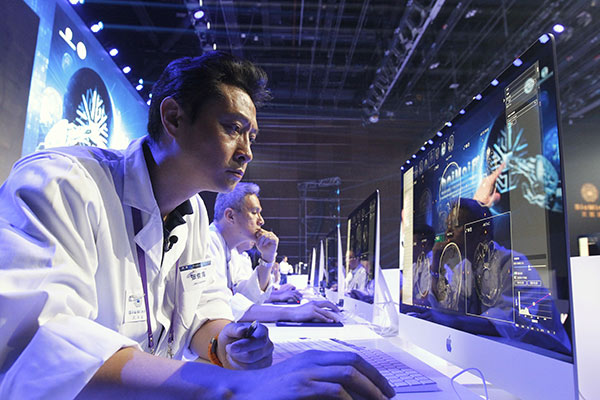AI defeats elite doctors in diagnosis competition

Radiologist Zhang Junhai from Shanghai Huashan Hospital reads a medical image display during a competition with BioMind, an artificial intelligence system, in Beijing on Saturday. CHINA DAILY
BEIJING — An artificial intelligence system recorded a 2-0 victory against elite physicians on Saturday in two rounds of a competition in Beijing to diagnose brain tumors and predict the expansion of brain hematomas, or bruises.
BioMind, developed by researchers from the AI Research Centre for Neurological Disorders and Capital Medical University, made correct diagnoses in 87 percent of 225 cases in about 15 minutes.
A team of 15 doctors from top hospitals across China achieved 66 percent accuracy in 30 minutes.
The AI system also made correct predictions in 83 percent of brain hematoma expansion cases, outperforming the physicians, who had only 63 percent accuracy.
“I’m not surprised at all by the results,” said Wang Yongjun, executive vice-president of Beijing Tiantan Hospital, which houses the research centre.
To train the AI, developers fed it tens of thousands of images of nervous system-related diseases that Tiantan Hospital has archived over the past 10 years, making it capable of diagnosing common neurological diseases with an accuracy rate of over 90 percent-comparable to that of a senior doctor-he said.
Cheng Jingliang, a professor in radiology at First Affiliated Hospital of Zhengzhou University in Zhengzhou, Henan province, said AI has already been used to help doctors read images, such as lung scans, for diagnoses at some Chinese hospitals.
However, the use of AI is still at its infancy in the medical field, and the accuracy of diagnoses by AI still lags behind that of senior professionals in most cases at the moment, he said.
Paul Parizel, chair of the radiology department at Antwerp University Hospital in Belgium and a member of the jury for Saturday’s contest, said he thinks integration of AI into medical services is a promising trend.
“It will be like a GPS guiding a car. It will make proposals to a doctor and help the doctor diagnose,” he said. “But it will be the doctor who ultimately decides, as there are a number of factors that a machine cannot take into consideration, such as a patient’s state of health and family situation.”
Spurred by the government, new technologies such as AI have been increasingly used in medical care in China in recent years.
In June, the Swedish medical company Elekta announced the introduction of Watson for Oncology, a medical AI system developed by IBM in the United States, to provide customized treatment plans for cancer patients in China. The AI platform has been used at 68 hospitals across China to help with cancer treatment.